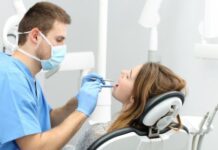As we age, our bodies go through many changes, and our dental health is no exception. Dental issues can arise as we get older, such as gum disease, tooth loss, and dry mouth. However, with proper care and regular visits to the dentist, we can maintain our smiles and overall oral health. In this article, we’ll discuss how to maintain your dental health as you age.


Brushing and flossing regularly
The foundation of good oral health at any age is brushing and flossing regularly. It’s recommended to brush your teeth twice a day with a fluoride toothpaste and floss at least once a day. Brushing and flossing help remove plaque, a sticky film of bacteria that can cause gum disease and tooth decay.
When brushing, use a soft-bristled brush and brush for at least two minutes, making sure to brush all surfaces of your teeth, including the front, back, and chewing surfaces, as well as your tongue and gums. Flossing helps remove plaque and food particles from between your teeth and along the gum line, where a toothbrush can’t reach.
Managing dry mouth
Dry mouth, or Xerostomia, is a common problem that can become more prevalent as we age. It occurs when the body doesn’t produce enough saliva, which can cause problems such as bad breath, tooth decay, and gum disease.
To manage dry mouth, drink plenty of water throughout the day and avoid alcohol and caffeine, which can dehydrate the body. Chewing sugarless gum or sucking on sugarless candy can also stimulate saliva production. If you have persistent dry mouth, talk to your dentist Campsie, as they may recommend a saliva substitute or other treatments.
Eating a balanced diet
Eating a balanced diet is important for maintaining good oral health at any age. As we age, it’s important to eat a diet rich in nutrients that promote oral health, such as calcium, vitamin D, and phosphorus. These nutrients can help keep our teeth and bones strong.
Foods that are high in sugar and carbohydrates can increase the risk of tooth decay and gum disease, so it’s important to limit these foods and drinks, including soda and other sugary beverages. Instead, choose foods that are high in fiber, such as fruits, vegetables, and whole grains.
Regular dental check-ups
Regular dental check-ups and cleanings are essential for maintaining good oral health as we age. Your dentist can detect and treat any dental problems, such as gum disease or tooth decay, before they become more serious. They can also provide professional cleanings to remove plaque and tartar buildup, which can cause gum disease and tooth decay.
During your dental check-up, your dentist may also perform an oral cancer screening, as the risk of oral cancer increases with age. Early detection is key to successful treatment, so regular check-ups are important for maintaining overall oral health.
Maintaining dentures and other dental prosthetics
As we age, we may require dentures or other dental prosthetics to replace missing teeth. It’s important to maintain these prosthetics to ensure they fit properly and function as they should.
Clean dentures daily with a soft-bristled brush and denture cleaner. Avoid using abrasive cleaners or toothpaste, as they can scratch the surface of the denture. Always remove your dentures at night to allow your gums to rest.
Maintaining good oral health as we age is essential for overall health and well-being. By brushing and flossing regularly, managing dry mouth, eating a balanced diet, and seeing your dentist for regular check-ups and cleanings, you can maintain your smile and overall oral health for a lifetime. If youhave dentures or other dental prosthetics, make sure to maintain them properly to ensure they fit well and function properly.

























